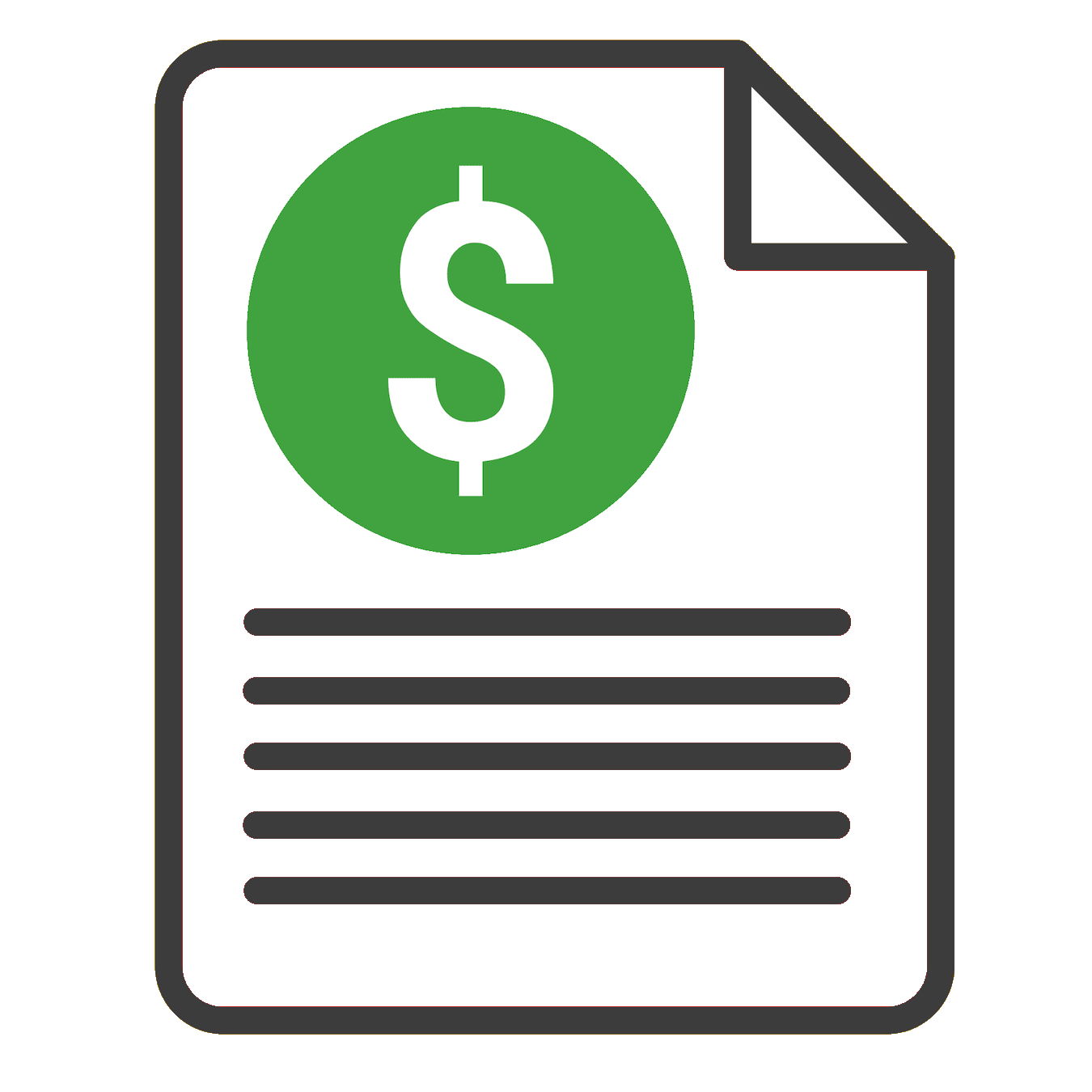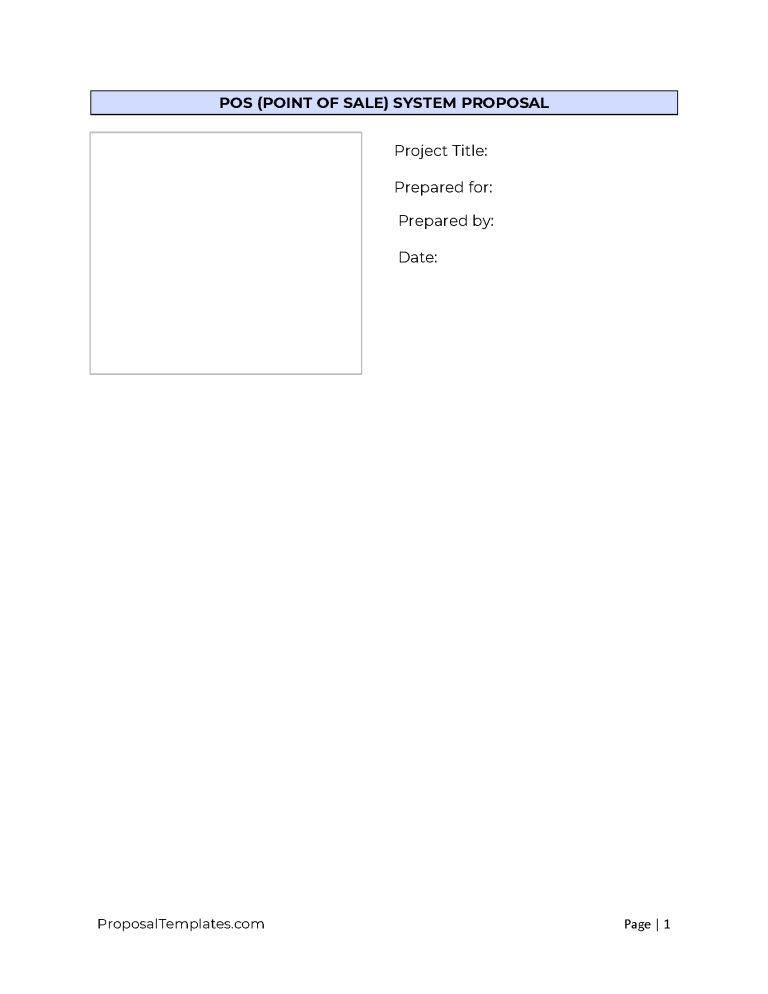The point of sale (POS) system sales proposal specifically promotes a transaction-oriented system’s hardware, software, and services. This proposal prompts client contact by highlighting the ROI (return on investment), efficiency, integration, and short and long-term costs.
Types Of Point Of Sale (POS) Proposals (13)
- Customized POS Sales – This proposal contains in-depth sections explaining a POS system’s versatility in handling unique needs.
- E-commerce POS Sales – Proposals featuring e-commerce solutions such as improved integrations and online ordering.
- Hardware-Only POS Sales – Proposals selling a POS system’s physical equipment, thus focusing on installation and hardware components.
- Healthcare POS Sales – This proposal focuses on patient management while demonstrating healthcare regulation guideline compliance.
- Hospitality-Specific POS Sales – Proposals approaching hospitality-based industry clients (i.e., restaurants, motels) and showcasing functions such as online reservations.
- Mobile POS (mPOS) Sales – Proposals concentrating on the user environments often wanted for mobile devices (i.e., tablets).
- Multi-Location or Franchise POS Sales – Proposals promoting a POS system’s multiple-site functions, such as centralized management features.
- Restaurant POS Sales – Proposals appealing to restaurant clients through specific discussions such as menu management and kitchen displays.
- Retail-Specific POS Sales – A proposal approaching retail clients with discussions promoting the POS system’s retail functions (i.e., inventory management).
- SaaS POS Sales – Proposals presenting a software subscription point-of-sale system’s data and security management since it is cloud-based.
- Software-Only POS Sales – This proposal concerns clients requiring new POS software, an upgrade, or replacement parts.
- Standard POS Sales – A popular proposal selling point-of-sale systems to companies while discussing their functionality and features.
- Startup POS Sales – A proposal addressing subjects such as user experience and affordability to attract new businesses.
1 . POS Sales Title Page
Approach the potential POS client with an attractive cover on the proposal that engages the client. For example, display the POS sales company’s logo or graphics developed to highlight the product.
Company Logo And Name, Contact Information
Proposal Title, Date, Author
- Visual Elements, Table Of Contents
- Required Certification
- Branding
2. Introduction To POS Sales Company
Start a discussion with an introduction of the POS sales company and a demonstrated knowledge of the client’s current situation. Begin piquing the client’s interest with the positive effects of working with the POS system being sold.
- Greeting, Formal Introduction, Purpose
- Client Needs, Proposal Overview
- Benefits, Client Objectives
- Gratitute, Call To Action
- Contact Information
3. POS Client Overview
Now, go into an in-depth description of the client’s current industry status, sales process, and challenges. When doing so, relate the client’s obstacles to the solutions the POS sales company can provide.
- Client Name, Client History, Industry Standing
- Current POS System, Client Objectives
- Client Pain Points, Technology Infrastructure
- Regulatroy Compliance
- Client’s Unique Selling Proposition (USP)
4. Client Needs Analysis
Impress the potential POS client by analyzing their obstacles and pain points while referring to previous discussions. Address topics such as its ability to smooth out a transaction process, thereby promoting the potential client’s sales efficiency.
- Operational Needs, POS Solutions
- Scalability, Integration Requirements
- Security, Reporting, Analytics
- Training, Support, Documentation
- Timeline, Deployment, Budget
5. Proposed Solutions
Continue promoting the POS system while presenting organized solutions to the obstacles faced by the client’s current sales system. Make sure the proposed solution objectives of the featured POS system are SMART (specific, measurable, achievable, relevant, time-bound) as well as affordable.
- Project Title, Background, Client Goals
- SMART Objectives, Prioritization
- Brand Identity Alignement, User Considerations
- Aesthetic Goals, Functional Goals
- UX Goals, Timeline
6. POS System Benefits
Produce a detailed presentation of the rewards gained from the POS systems, especially concerning cost. In fact, if relevant, inform the client of alternate client-specific plans or packages.
- Enhanced Customer Experience, Efficiency
- Error Reduction, Improved Security
- Inventory Management, Cost Savings
- Revenue Growth, Integrated Reporting
- Scalability, Training, Documentation, Support
7. Pricing And Packages
Display every POS system cost through an itemized breakdown of expenses together with the total package price. For instance, document installation costs, training, ongoing support, and any software or hardware requiring payment (i.e., SaaS).
- Pricing Structure, Package Options, Installation
- Itemized Costs, Hardware Costs. Additional Services
- Software Licensing, Support/Maintenance
- Fees, Taxes, Payment Methods, Total Cost
- Terms And Condition, Discounts, Validity Period
8. ROI Analysis
Prepare an analysis of the POS system costs vs. its return or (if applicable) profitability since this will maintain interest. Comparitively discuss the different packages, subscriptions, or contracts available.
- Investments Costs, Revenue, Operational Cost Reduction
- Error Reduction, Security Banefits, Risk Assessment
- Customer Retention, Training/Support Costs, Time Savings
- Sensitvity Analysis, Visuals, Recommendations
- ROI Calculation, ROI Timeframe, Conclusion
9. Implementation Plan
Present the integration process of the POS system, focusing on subjects such as security, data migration, and training. Also, deliver a timeline or a schedule for the implementation phase of the sale.
- Project Timeline, Project Kick-Off, Implementation Team
- Pre-Implementation Phase, Requirements Gathering
- Assessment, Data Migration Plan, Parallel Operations
- Software/Hardware Procurement, Configuration
- Customizations, Testing/Quality Assurance, Training
10. POS Support And Maintenance
Lay out the support plans available to the client for the POS system while comparing the subscription packages available. For example, discuss the response times and costs for the long-term maintenance of the POS system versus short-term plans with fewer financial responsibilities for the client.
- Communication, Help Desk, Client Portal, Response Times
- Technical Assistance, Availability, Response Times
- Hardware Maintenance, Remote Support, On-Site Support
- Esculation Procedures, Service Level Agreements (SLA)
- Training Updates, Proactive Maientance, Renewal Terms
11. References And Testimonials
List the contact information of previous customers who will recommend the POS system whenever a potential client contacts them. Additionally, provide positive public mentions and testimonials of past clients.
- Reference List, Previous Project Descriptions
- Past Client Testimonials, Permissions
- Case Studies, Long-Term Clients
- Professional Presentaton, Media
- Privacy Statement, Contact Information
12. Terms And Conditions Of POS Sale
Ensure the client receives all the legal documentation concerning this proposal (such as a sales contract). This paperwork should contain agreements for the POS system purchase as well as any supporting or required agreements and notices.
- Scope Of Project, Payment (Terms, Schedule, Methods)
- Intellectual Property Rights, Ownership Usage Rights
- Revisions, Cancellations, Terminations, Timeline
- Confidentiality, Liability, Indemnification
- Effective Dates, Jurisdiction, Acknowledgment
13. Next Step For The POS Client
Maintain the momentum of the proposal throughout a discussion on what the next step for the client should be. Encourage the client to contact the POS company to consult further or proceed to a contract.
- Proposal Summary, Call To Action
- Reiteration Of Value, Timeline (Validity)
- Grattitude, Encouragement, Prompting
- Contact Information, Availability, Flexibility
- Client Commitment, Acknowledging Signature

